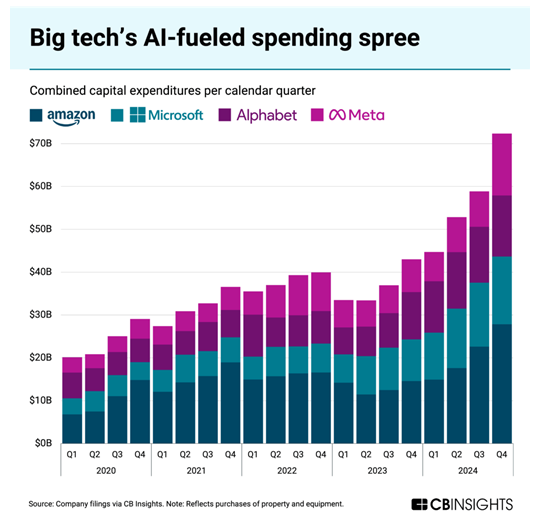Beyond Generative AI: How Quantum, AR/VR, Robotics, Cloud, and Blockchain Investments Will Transform Business
While generative AI dominates tech headlines, Big Tech are making significant investments in quantum computing, augmented reality, humanoid robotics, cloud infrastructure, and blockchain technologies.
Major technology corporations continue to demonstrate strong financial performance with double-digit revenue growth. Looking forward, these organizations are strategically investing in artificial intelligence, pursuing mergers and acquisitions, developing humanoid robotics, and exploring other innovative technologies.
While public attention often centers on Generative AI, these tech leaders are taking a broader approach by integrating technology across various business processes. This highlights the importance of prioritizing business problem identification over technology implementation.
Organizations should avoid becoming fixated on specific technologies, as this may lead to suboptimal outcomes. Instead, collaborating with technology providers who can offer streamlined or innovative solutions to pressing business challenges will likely yield better results.
Big Tech Investments in Non-Generative AI Technologies Set to Transform Work and Business
While generative AI has dominated headlines, Big Tech firms are making substantial investments in a range of other advanced technologies that are poised to reshape the work and business environment in the near term. This report highlights key instances of such investments by leading tech companies—including Google, Microsoft, Amazon, Meta, and others—across quantum computing, augmented and virtual reality (AR/VR), robotics and automation, cloud and edge infrastructure, and blockchain technology.
Quantum Computing: A New Computational Paradigm
Google
Google has taken a major leap in quantum computing with the unveiling of its Willow chip in December 2024. The chip boasts 105 qubits and can perform certain computations in under five minutes that would take conventional supercomputers many orders of magnitude longer. Google’s leadership projects that commercial quantum computing applications could emerge within five years, with the potential to revolutionize industries such as drug discovery, materials science, and logistics—fields that underpin the future of work and business processes [1][2].
Microsoft
Microsoft is also pushing the boundaries with its Majorana 1 chip, which uses topological qubits for enhanced error resistance and scalability. This approach could overcome one of the biggest barriers to practical quantum computing—error correction—and accelerate the deployment of quantum solutions in business-critical domains [3].
Augmented and Virtual Reality (AR/VR): Redefining Collaboration and Human-Computer Interaction
Meta
Meta has invested heavily in AR and VR, with its Orion project representing nearly a decade of R&D. Orion aims to merge digital and physical environments, enabling immersive communication and collaboration experiences that could redefine remote work, training, and customer engagement. Although not yet commercially available, Meta’s advancements in AR glasses and spatial computing are expected to usher in a paradigm shift in how businesses connect and collaborate [4][5].
Robotics and Automation: Physical Transformation of Workplaces
Meta
In 2025, Meta announced a major investment in AI-driven humanoid robotics, forming a dedicated division within its Reality Labs unit. The initiative focuses on developing robots that can assist with physical tasks, potentially transforming sectors such as logistics, manufacturing, and healthcare by automating repetitive or hazardous work and augmenting human capabilities [6][7].
Cloud Infrastructure and Edge Computing: The Backbone of Digital Transformation
Amazon Web Services (AWS)
Amazon is making historic investments in cloud infrastructure, with over $30 billion allocated in 2025 for new data centers in Pennsylvania and North Carolina, and a total $100 billion expansion plan. These investments are designed to support not only AI but also the broader digital economy, ensuring businesses have access to scalable, secure, and energy-efficient computational resources. AWS is also expanding its edge computing offerings through services like AWS Wavelength, which brings cloud capabilities closer to end users for low-latency applications—crucial for IoT, real-time analytics, and next-gen workplace tools [8][9][10][11].
Microsoft Azure
Microsoft is similarly investing $80 billion to scale up its global data center footprint. Its Azure Edge Zones initiative aims to dominate edge computing and 5G, enabling ultra-low-latency applications and supporting the proliferation of smart devices and real-time business operations [12][13].
Blockchain and Web3: Securing and Streamlining Business Processes
Microsoft
In 2025, Microsoft integrated real-time blockchain data feeds into its Fabric analytics platform through a partnership with Space and Time Labs. This enables businesses to access verifiable, real-time data for major blockchains, supporting innovations in finance, supply chain, and data integrity. Microsoft’s venture arm has also made strategic investments in blockchain infrastructure, underscoring its commitment to decentralized technologies [14].
Industry-Wide Adoption
According to a 2025 survey, 60% of Fortune 500 companies are now working on blockchain initiatives, signaling rapid mainstream adoption. Blockchain is being leveraged for payments, smart contracts, and secure data sharing, which are expected to have a profound impact on business efficiency, transparency, and trust [15].
Conclusion
Big Tech’s investments in quantum computing, AR/VR, robotics, cloud and edge infrastructure, and blockchain are setting the stage for a transformed work and business environment. These technologies, while distinct from generative AI, are converging to enable new forms of collaboration, automation, security, and computational power, with tangible impacts expected in the near term. As these investments mature, businesses across industries should anticipate and prepare for fundamental changes in how work is organized, delivered, and experienced.
Notes:
The above research was conducted using Notion AI research. The articles and references were quickly identified through Notion AI and subsequently, helped me learn more on the shared topic.
References
[1] Google's Willow Chip: A Quantum Breakthrough Reigniting the Multiverse Debate
[2] Google's Bold Prediction: Commercial Quantum Computing Applications in Five Years. Will It Happen?
[3] Microsoft Quantum Chip Majorana 1
[6] Meta Expands AI Ambitions with Investment in Humanoid Robotics
[7] Meta Plans Major Investment into AI-Powered Humanoid Robots
[8] Amazon Doubles Down on AI Infrastructure with $30B in New US Data Center Investments
[9] Amazon's $100 Billion Data Center Expansion
[10] AWS Wavelength
[11] AWS Edge
[12] Microsoft's $80 Billion Data Center Expansion: A Game-Changer for Cloud Infrastructure
[13] Google Cloud Distributed Cloud Connected
[14] Microsoft Adds Real-Time Blockchain Data to Fabric Through Space and Time Integration
[15] Blockchain Initiatives Have Been Adopted by 60% of Fortune 500 Companies: Coinbase Survey





